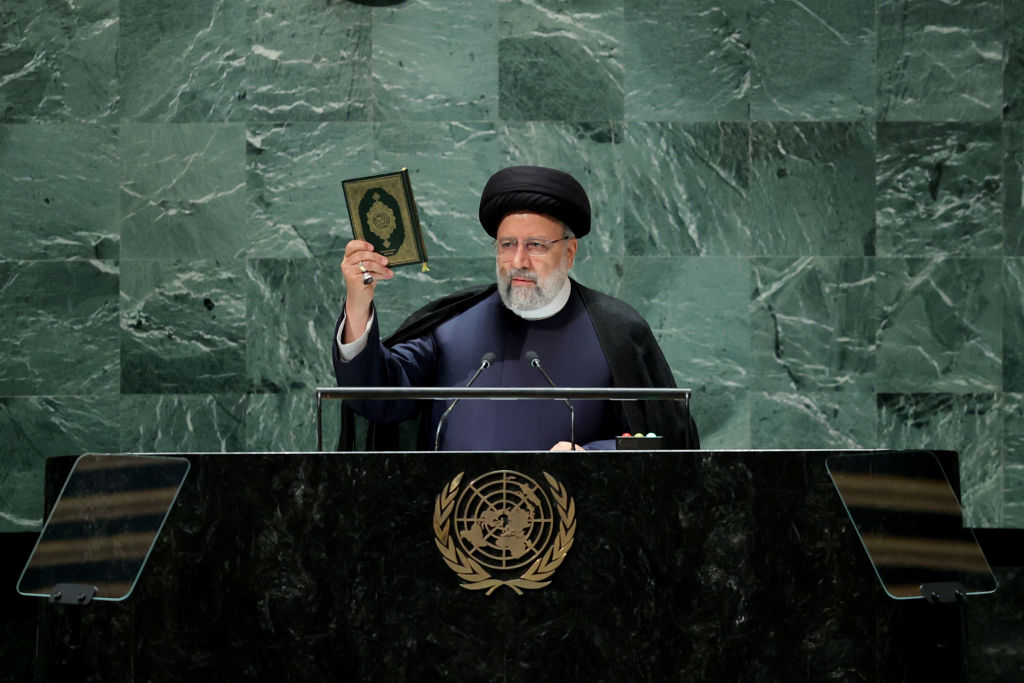Iran Shows No Signs of ‘De-Escalation’
Happy Wednesday! Our best wishes go out to the Secret Service agent who was bitten by “a First Family pet” this week. President Joe Biden’s dog, Commander, has now been involved in 11 publicly known biting incidents and remains on the journey to becoming a good boy.
Quick Hits: Today’s Top Stories
- President Joe Biden joined the United Auto Workers picket line at a General Motors plant outside Detroit on Tuesday, placing himself firmly on the side of the striking workers and marking the first time a sitting president has joined a picket line. “Stick with it,” Biden said in bullhorn remarks. “You deserve what you earned, and you earned a hell of a lot more than what you’re getting paid now.” The visit comes the day before former President Donald Trump is scheduled to speak to autoworkers at a car parts manufacturer and supplier outside Detroit.
- The Federal Trade Commission (FTC) along with 17 states filed a wide-ranging antitrust lawsuit against Amazon Tuesday, alleging the company has illegally protected a monopoly in online retail. According to the suit, Amazon penalizes merchants if they offer lower prices on competitor platforms and compels sellers to use its logistics services if they want Amazon Prime’s expedited shipping to apply to their products. The FTC is calling for “structural relief,” which typically involves a company divesting assets or splitting up, but FTC Chair Lina Khan hasn’t said explicitly that the agency is pursuing a breakup. The suit is a long time in the making—while Khan was still in law school in 2017, she wrote an influential paper calling for antitrust scrutiny of Amazon.
- The Senate moved a bipartisan stopgap spending measure to fund the government forward Tuesday evening by a 77-19 procedural vote. The bill would prevent a shutdown through November 17 and provide $6 billion in aid to Ukraine and $6 billion in disaster relief funds. Senate leadership aims to pass the bill by the end of the week, pressuring House Republicans to agree to the plan or risk being blamed for a government shutdown. Meanwhile, the House finally passed the rule last night to move forward with a vote on four of the GOP appropriations bills this week, and House Speaker Kevin McCarthy is still planning to take up a House continuing resolution that pairs funding the government with some spending cuts and border security measures.
- California Gov. Gavin Newsom signed a law on Tuesday adding an 11 percent state tax to firearms, firearm parts, and ammunition, the proceeds of which will go toward funding public school security and violence prevention programs. The move made California the first state in the country to levy an excise tax on guns and ammunition. The federal government currently imposes a 10 percent tax on wholesale prices for handguns and an 11 percent tax on long guns and ammunition. Newsom also signed a measure limiting where people can carry concealed firearms.
- The Supreme Court on Tuesday declined to reinstate an Alabama congressional map drawn by Republican lawmakers that only included one majority-black district, which a lower court had thrown out earlier this year. The lower court will likely decide on the final map based on recommendations submitted by the special master in the case.
- A New York judge ruled yesterday that Trump committed fraud by inflating the value of his properties and other assets by hundreds of millions of dollars in order to receive better loan terms and lower insurance premiums. The decision came in the civil case brought by New York Attorney General Letitia James against the former president. Justice Arthur Engoron also rescinded some of Trump’s New York business licenses. The case is a bench trial decided by the judge rather than a jury and the remainder of James’ claims against Trump will be addressed when the trial starts on Monday.
Spurning Biden Overtures, Iran Re-Escalates Tensions on U.S. Soil

For nearly three years, the operative word in the Biden administration’s approach to Iran has been “de-escalation.” In public statements and private briefings, top advisers to President Joe Biden used the term both descriptively—to characterize the administration’s posture toward the Islamic Republic by contrasting it with the “maximum pressure campaign” employed by the Trump administration—and aspirationally, signaling hope that Iran would respond to the new U.S. approach by dialing back its hostility and engaging more constructively on issues from human rights to the nuclear file.
In a speech last spring on the Biden administration’s approach to the Middle East, National Security Adviser Jake Sullivan referred to “de-escalation” nearly a dozen times, referring to Iran-U.S. tensions concerning Iraq, Yemen, and Saudi Arabia. Sullivan described a regional strategy of “deterrence and diplomacy” and said that “we’ve had a clear-eyed view of defending our interests, of preventing terrorist threats, of trying to de-escalate tensions, of trying to reduce risks of new conflicts, and of trying to end existing ones.” Secretary of State Antony Blinken sounded a similar note in a press conference in mid-August: “We’ve been clear that Iran must de-escalate to create space for future diplomacy.”
While Biden administration officials have usually been careful not to portray this more conciliatory approach as a panacea, they’ve often expressed guarded optimism that a less aggressive posture toward the Iranian regime by the U.S. could well lead to productive diplomacy on renewing the Iranian nuclear deal and other regional issues. While there have been few signs of change, the recently executed prisoner exchange, which included granting Iran access to $6 billion in previously restricted funds, rekindled optimism among Biden administration officials.
Perhaps not for long.

Worth Your Time
- Writing for Reason, Elizabeth Nolan Brown unpacks the whirlwind developments in the antirust world over the last half decade as the “hipster” antitrust school of thought has grown in prominence. “Even as the new antitrust movement gained power—and flexed it—its efforts flailed,” Brown writes. “Public support fizzled or failed to appear entirely, and the movement’s fundamental premises have fallen apart, wrecked by dynamism, jurisprudence, and political expediency. Meanwhile, the worst of the antitrust alarmism keeps proving untrue, as tech companies believed by some to be unassailable ‘monopolies’ instead lose users, market share, and prestige.” Brown highlights instances where leading antitrust scholars—including current FTC chair Lina Khan—predicted an acquisition would lead to disaster only to subsequently be proven wrong. “In 2017, for example, Amazon announced that it would purchase the grocery chain Whole Foods for approximately $13.7 billion,” she writes. “In response, Khan, then still in grad school, published an op-ed in The New York Times predicting disastrous results for competitors. By ‘bundling services and integrating grocery stores into its logistics network, [Amazon] will be able to shut out or disfavor rival grocers and food delivery services,’ she wrote. In fact, in the years since Amazon’s merger, multiple large retailers have grown faster or performed better in the stock market; direct competitors in the online grocery sales sphere have grown significantly. Meanwhile, Whole Foods and Amazon only control a small percentage of the grocery market.”
Presented Without Comment
Wall Street Journal: Target to Close Stores in New York, San Francisco Citing Safety, Theft Concerns
Also Presented Without Comment
Associated Press: Canada’s House speaker resigns over inviting a man who fought for a Nazi unit to Parliament
Toeing the Company Line
- Does the second GOP debate even matter? What’s going on with the government shutdown? Do we live in a classless society? Kevin was joined by Andrew, Drucker, Chris, Grayson, and Jonah to discuss all that and more on last night’s Dispatch Live (🔒) Members who missed the conversation can catch a rerun—either video or audio-only—by clicking here.
- In the newsletters: Nick explains (🔒) how the GOP debate could become the moment when Trump-skeptical Republicans consolidate behind one challenger to the former president and Harvest details why such a small group of Republican rebels have such power over Kevin McCarthy.
- On the podcasts: Michael Warren talks with Liam Donovan on the Dispatch Podcast to break down what’s happening on Capitol Hill as the government runs out of money at the end of the month and Jonah is joined by Matthew Continetti on the Remnant to discuss government shutdowns, what’s wrong with conservative institutions, and whether populism can be a good thing.
- On the site today: Tevi Troy explores dissolution of our political parties, Kevin weighs in on the “how often men think about the Roman Empire” question, Jonah explains what the Republicans forcing a government shutdown share with 1960s radicals, and Haley interviews Rep. Mike Gallagher about the GOP debate.